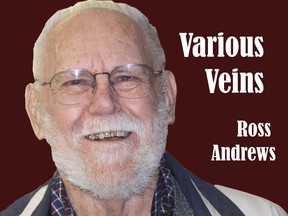There's nothing simple in history

Article content
A headline, On Acadian Soil, caught my attention in a recent Saturday Post. A 75-year-old woman came from Cajun County in Louisiana to take part in a geological dig in Nova Scotia.
Anything about Cajuns and Acadia interests me, roots going back to my public school days when I was introduced as a student to the story of the great expulsion. When I became a teacher I passed the story along to a host of Tillsonburg boys and girls.
When I read that the dig was on the site of Village Thibodeau near Windsor, Nova Scotia my interest was sharpened. Did the family of my first French teacher at St. Thomas Collegiate Institute come from that village? Perhaps not. The article notes that the name was common in various areas.
The story tells of Clara Darbonne reaching the site of her family's homestead and adds, " in what was known as Village Thibodeau before its inhabitants were forcibly ejected by the British two-and-a-half centuries ago."
I don't trust my memory since making some humbling errors in the past few years. This blunt attribution to the British of the ejection sent me checking for details through several history books in my library. To my surprise some texts do not mention the expulsion at all. Others are too vague to be of any help. Apparently historians haven't seen it as a big deal.
Craig Brown, editor of The Illustrated History of Canada, provided the name and office of the man who started the process. Acting governor of Nova Scotia Colonel Charles Lawrence was aware that some Acadians who had sworn allegiance to the Crown were not abiding by their promise. Some were found in a French fort when British forces captured it. It seemed prudent to Lawrence to send the whole lot out of the war zone.
During World War II Winston Churchill suggested the same sort of treatment of Japanese residents on Canada's west coast. We know his advice was taken seriously at the time.
The Acadians were not simply playing games. French from outside Nova Scotia were burning buildings of reluctant Acadians to remind them of where their true allegiance should be. The tragic past of these families was not entirely the work of the British.
The homestead settled by Pierre Thibodeau in 1690 has been owned by only two families down the years. The Shaw family came from what became The United States to take up the land left vacant by the expulsion. Descendants of both are now peacefully probing into their past.
The British leaders in Nova Scotia were being urged to allow Yankees to take up land that had been Acadia, another factor in Governor Lawrence's action to send the Acadians south.
If you dig deeper into the past of Acadia, you find that members of two French cultures fought among themselves before the British came upon the scene. Nothing in history is simple.
Many people believe that some higher power guides the events in our lives. I do not subscribe to that way of accounting. I see life as a sort of Brownian motion like the jiggling of molecules as seen under a microscope. In the Post article there are examples of individuals and families coming into contact since the great expulsion. The meetings are good, but a search would no doubt uncover stories with painful outcomes. Who wants to know about those?
In the end, seen up close events such as the expulsion, wars civil and not so civil, a town incinerated by wild fire or a derailed train, all are tragic, but without them many positive events would never come to pass.